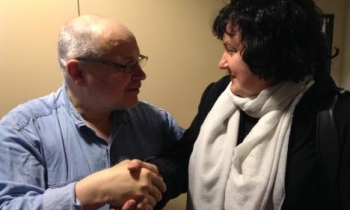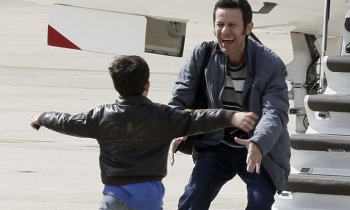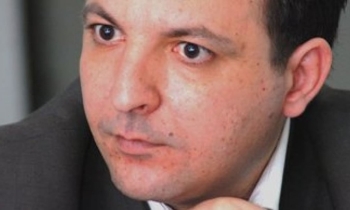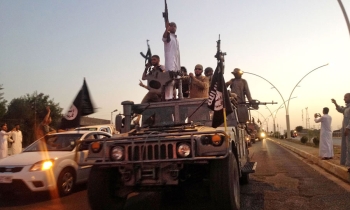NEW YORK: By the time Washington Post reporter Griff Witte took up his three-month post in Afghanistan last November, the 27-year-old had already acquired a substantial working knowledge of the country and its history. As a researcher for former Post managing editor Steve Coll's Pulitzer Prize-winning book Ghost Wars, Witte had traveled extensively in the country in 2002. One lesson he'd quickly learned: the cultural significance of a more hirsute appearance.
"Someone came up to my translator and said, 'This person you are with is a very beautiful woman,' Witte laughs. "The translator told me that the man was not saying anything bad; he really thought I was a woman. Once I started growing my beard, that never happened again."
Coll went on to offer generous praise for Witte, crediting him in the book with being "an ideal collaborator and essential to the entire project." Today he calls Witte "such a balanced, easygoing person while at the same time being such a tenacious journalist. You don't often find both of those qualities in the same person."
Upon his return to Afghanistan last fall, this time as a Post correspondent, Witte found that the increasingly perilous security situation had significantly changed the reporting landscape. Though he did travel to provinces in several regions, the rising insurgent violence, along with attacks on U.S. and coalition forces, meant most of his reporting took place in and around Kabul.
He appreciated the surprisingly modern cell phone network, but since few people could afford a telephone, most of his reporting was the "running-around, shoe-leather reporting that forces you to get out there and talk with people."
Reporters aren't targets in a way they are in Iraq, "but obviously the insurgents are looking for Western targets, and if they can get their hands on a Westerner, they will," he notes. The suicide bombings -- virtually unheard of here until last year -- have increased fourfold. Particularly troubling is the uncertainty of their genesis: Are they mimicking attacks in Iraq, or is there actual coordination between insurgents in Iraq and Afghanistan?
Though Witte never wore his flak jacket and helmet, he did tend to curtail his time on the streets. "I did feel I had to maintain a low profile, and not linger on a lot of my reporting trips, not stay out in public as long as I'd like," he acknowledges. "You do tend to draw a crowd in Afghanistan. You start talking with one person, and end up with about 30 people around, not angry or threatening, just curious and wanting to know what I was asking about, wanting to put in their two cents."
One sign of possible progress: The ragtag militia members "who used to pass time during my interviews with their leaders by nervously flipping the safety on their Kalashnikovs have all become addicted to cell phone video games."
He remains surprised that there is so little coverage of Afghanistan beyond the wire services and the major metros (he was the lone Post reporter there): "There's no television presence whatsoever, and this is a very visual story. We've got 19,000 troops there, a lot of the world's leading terrorists are there or across its border, and the country is supplying 80% of the world's heroin. As we found out on 9/11, it bears relevance to what's going on in our towns and cities. We lose sight of Afghanistan at our own peril."
While the war in Afghanistan tends to drop off the media's radar screen, it reappeared as front-page news in early March, with President Bush's five-hour stopover, the first visit by a U.S. President since Eisenhower. Notes Witte: "The administration would like to hold up Afghanistan as a major success story, but it's not there yet."
He does believe there are hopeful signs that the Afghan government is extending its authority beyond Kabul, and that the army is beginning to act more professional. But the national police force remains rife with corruption and riven by competing local and regional interests: "In Uruzgan province in the south, people said the police were more of a threat than the Taliban."
Witte returned from the country in March but would have stayed longer, had his wife, Emily Bliss, a writer and teacher at George Washington University, been able to join him. Security considerations make that an unlikely scenario for now. The two met at Princeton, where he was managing editor of the school paper. Both worked at The Miami Herald after graduation in 2000, an experience Witte feels was especially good preparation for Afghanistan: "There was every manner of craziness in South Florida, including the 2000 Presidential elections. I got the feeling that the news was chasing me around for a while."
That was certainly true when he found himself attending the Columbia Journalism School in September 2001 and covered the World Trade Center attacks for the Herald. Two weeks later, he got a call from a Post reporter who had lectured at Princeton, saying he had a colleague he couldn't yet name, who needed a researcher for a book whose subject he could not yet reveal. Hypothetically, would Witte be interested?
His first thought: "Woodward."
Two months later, Witte, who says he has always wanted to be a foreign correspondent, had interviewed with not Woodward but Steve Coll, gotten the job, quit graduate school, and moved to D.C. with his wife. He joined the Post as a reporter in 2003.
Coll, now a staff writer at The New Yorker, calls Witte's recent reporting from Afghanistan "outstanding." Asked how he assesses the current coverage of that country, he tells E&P, "It's essential to have independent, well-resourced correspondents steadily asking awkward questions about what's going right and what isn't, about what kind of place Afghanistan is becoming and why. Outside a handful of papers with the resources and commitment to sustain coverage of the story, the American media have done a poor job overall producing sophisticated coverage of Afghanistan since the fall of the Taliban.
"The problem is not a lack of courage among correspondents," Coll added, "but a lack of resources, and at times, a lack of leadership among newsroom editors, who admittedly are under exceptional economic pressures these days."
Witte is not sure what his next beat will be but he is content to stay in Washington for now, even as he hopes the security situation in Afghanistan will improve so he could return at some point with his wife. He says the story there is compelling because the potential is so great: "Unlike Iraq, all the ingredients are there for a successful country. The country desperately wants peace. People there are generally supportive of the U.S. My whole time there, I didn't encounter anyone hostile to me because I was an American."
Barbara Bedway (letters@editorandpublisher.com) is a frequent contributor to E&P.









